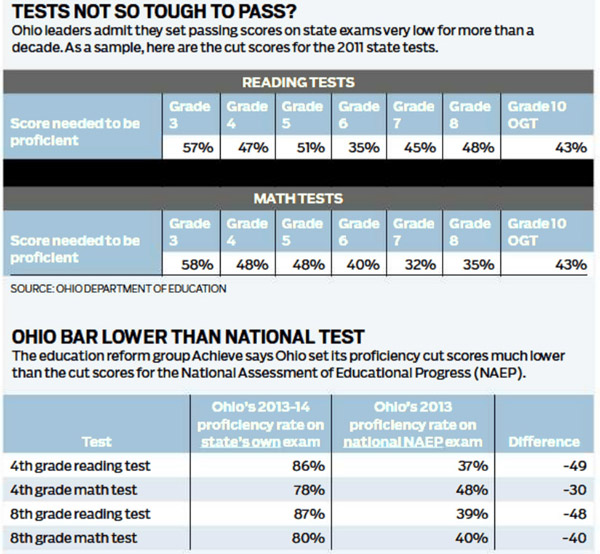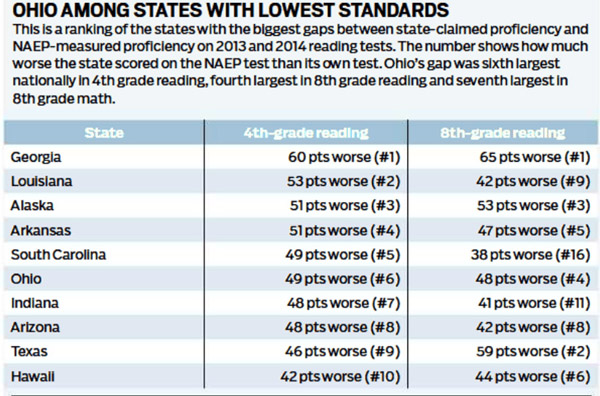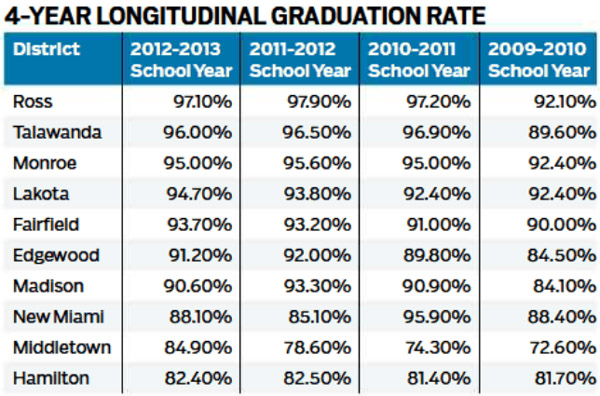 |
| Home | Yearly News Archive | Advertisers | Blog | Contact Us |
|
 |
Friday, February 6, 2026 |
|
School testing to get tougher |
Post Reply 
|
| Author | |
Vivian Moon 
MUSA Council 
Joined: May 16 2008 Location: Middletown, Ohi Status: Offline Points: 4187 |
 Post Options Post Options
 Thanks(0) Thanks(0)
 Quote Quote  Reply Reply
 Topic: School testing to get tougher Topic: School testing to get tougherPosted: May 31 2015 at 8:33am |
School testing to get tougher for students
Current standards too low, experts say
Staff Writer For
more than a decade, Those
results led some parents to believe their children were doing better against
peers in other states than they actually were. “We
have very low expectations in the state of State
officials admit the low bar served a simple purpose: schools looked better to
the public and stayed out of “academic emergency.” And that likely eased
pressure to raise performance. This
summer, “We
have to raise the scores,” said state school board president Tom Gunlock. “We
have to tell people exactly where we are, instead of continually lying to
people.” The
education reform group Achieve, a Common Core educational standards advocate,
this month ranked the cutoff scores on ·
·
While the state said 90 percent of Ohio seniors met Ohio
Graduation Test requirements in 2013, only 63 percent of those students who
went on to an Ohio college were able to begin college without remedial help. Some,
like Gunlock, say students and educators will rise to the occasion if held to
higher standards. Others
say setting the bar higher could causes thousands of “Are
you willing to say to the people of this state that 70 percent of our children
fail (these tests)?” asked Springfield City Schools superintendent David
Estrop, pointing to “Second
question: If we say that’s OK, what’s the plan to deal with those 70 percent?
Do 70 percent or 60 percent of the kids of House
Education Committee member Mike Henne called them “terrible.” Senate Education
Committee Chair Peggy Lehner said they were clearly too low. To
be proficient (or passing), an “In
our world, even on our report cards, if you walked into your house and said to
your mom, ‘I got 37 percent on my test and it was proficient,’ that’s a
contradiction,” said Houser. “But in the state of The
report by Achieve took individual states’ proficiency standards and compared
them to the states’ performance on the national test from NAEP. The
report claimed The
state took a big step toward a higher bar by implementing new learning
standards and harder tests this year, including English and math tests from
PARCC (Partnership for Assessment of Readiness for College and Careers) and
science and social studies tests from AIR (American Institutes for Research). School
officials say the new tests also focus more on critical thinking and problem
solving. Students, for example, must explain how they arrived at an answer and
some questions have more than one correct answer. This replaces past tests that
have been filled with multiple choice answers, where some students might guess
their way through the test. “There’s
an increased emphasis on being able to demonstrate your understanding of how
you’re going about solving a problem or arriving at your solution,” said Keith
Millard, the assistant superintendent for instruction at the Hamilton City
School District. He
added that in answering reading questions, too, the tests place a bigger
emphasis on citing evidence from text. Those
tests have been finished for weeks, but the state hasn’t set passing score
standards yet and PARCC hasn’t explained the scoring process yet. Scores won’t
be available until the fall. “You
really have no idea what target it is that you’re shooting for,” said Keith
Millard, the assistant superintendent for instruction at the PARCC
officials said representatives of the 11 member states will review graded tests
in July and August, and recommend cutoff scores for the five-level scoring
system. PARCC’s governing board, which includes The
biggest change is in the five scoring levels. In Despite
the controversy over the states proficiency scores, officials at Since
2010, the university has seen a two-point increase in ACT scores for “We’re
seeing students who are incredibly well-prepared, particularly in looking at “They’re
demonstrating that they’re prepared to take more challenging coursework.” Sen.
Lehner said kids will improve if the tests improve — even if the state must suffer
through a few first years of bad test scores. “Look
at Lehner
also wants all states to have the same proficiency standards on tests. Letting
each state set its own score means that students in different states could take
the same test, provide the same answers, and be declared passing in one state
and failing in the other. Regardless
of what the legislature decides, the schools are the ones who will have to hand
out the tests. “It’s
really a state issue, not a district issue,” said Despite
educators’ complaints about constant change in schools, Ohio House members this
month supported a bill that could completely ditch the PARCC and AIR tests and
start over next year. The
Senate seems less likely to go that route, and Ohio Department of Education
spokesman J.C. Benton pushed back against that idea, saying if Ohio wants its
students to make progress, the state needs to “stay the course” with Common
Core and PARCC and AIR assessments. Gunlock
said that after PARCC approves cut scores, it’s possible the state legislature
would vote to throw out the scores and create its own scale. “I
hope and pray that they do what is best for kids and the state of |
|
 |
|
VietVet 
MUSA Council 
Joined: May 15 2008 Status: Offline Points: 7008 |
 Post Options Post Options
 Thanks(0) Thanks(0)
 Quote Quote  Reply Reply
 Posted: May 31 2015 at 9:47am Posted: May 31 2015 at 9:47am |
|
"For more than a decade, Ohio students were deemed “proficient” on state math and reading tests even if they got more questions wrong than right.
Those results led some parents to believe their children were doing better against peers in other states than they actually were. “We have very low expectations in the state of Ohio. It’s pathetically low, ” said Middletown City School District assessment coordinator Deborah Houser. “Basically, it’s time to up the expectations.” State officials admit the low bar served a simple purpose: schools looked better to the public and stayed out of “academic emergency.” And that likely eased pressure to raise performance." Alright Ms. Houser, then can you explain why the district is always tooting their own horn about how much they have improved in the test scores and how much progress they have made, especially around levy time? Seems to me, by this statement, that you school people knew all along that you were participating in an evaluation system that was presenting false indicators versus the real situation just to get your levies passed. Yes voters, all these years you have been duped into thinking this district was getting better if you kept feeding them more money. It has not, nor has it ever been the case. They have lied to you and fed you propaganda to get what they wanted while the approving voters have been played the fool many times. "“We have to raise the scores,” said state school board president Tom Gunlock. “We have to tell people exactly where we are, instead of continually lying to people.”" Even the state school board president admits it's been a sham. "Ohio used to score well above the national average on the National Assessment of Educational Progress (NAEP) reading tests, but its scores have stagnated and even declined in the past six years while other states narrowed the gap." We are paying more for regression. Why? Doesn't sound like a good deal for our money. "“Are you willing to say to the people of this state that 70 percent of our children fail (these tests)?” asked Springfield City Schools superintendent David Estrop, pointing to New York’s 69 percent failure rate when it set a very high bar. “Second question: If we say that’s OK, what’s the plan to deal with those 70 percent? Do 70 percent or 60 percent of the kids of Ohio not graduate? What do we do with them?”" Here's an idea Mr. Springfield superintendent.....start doing the job we pay you well to do. Time to end the excuses and JUST DO YOUR DAM JOB like the rest of us who draw a paycheck are expected to do. The cottling must end in the academic world. Time to go to work people. You are paid well in return. Do your job. Change? Happens all the time in the private sector. Job demands never stay the same. More and more is expected from the worker bee. Live with it. |
|
|
I'm so proud of my hometown and what it has become. Recall 'em all. Let's start over.
|
|
 |
|
TonyB 
MUSA Citizen 
Joined: Jan 12 2011 Location: Middletown, OH Status: Offline Points: 631 |
 Post Options Post Options
 Thanks(1) Thanks(1)
 Quote Quote  Reply Reply
 Posted: May 31 2015 at 9:58am Posted: May 31 2015 at 9:58am |
|
The real question should be: "Why was school testing ever allowed to get easier in the first place?" That's because the new methods of teaching for testing is a failure. The unrealistic expectations of those teaching methods where we have "quanifiable metrics" to measure effectiveness have proven it. Public education has been taken over by politicians who know nothing about teaching. Doing the job that teachers are paid to do would be much easier if those who aren't teachers would get out of the way. It's about teaching HOW to learn because it is something a child will do for the rest of their adult life!
|
|
 |
|
409 
Prominent MUSA Citizen 

Joined: Mar 27 2009 Status: Offline Points: 1014 |
 Post Options Post Options
 Thanks(0) Thanks(0)
 Quote Quote  Reply Reply
 Posted: May 31 2015 at 11:55am Posted: May 31 2015 at 11:55am |
 
|
|
|
Every morning is the dawn of a new error...
|
|
 |
|
VietVet 
MUSA Council 
Joined: May 15 2008 Status: Offline Points: 7008 |
 Post Options Post Options
 Thanks(0) Thanks(0)
 Quote Quote  Reply Reply
 Posted: May 31 2015 at 7:06pm Posted: May 31 2015 at 7:06pm |
|
Hmmm. Don't seem to be hearing from the folks who always defend this school district( state school system) when a story starts lobbing negative barrages against their beloved system, when data is produced showing the situation is not rosy and positive. So, how are all of those new school buildings with the technological edge working out for you now? Doesn't appear that all of those new programs, new buildings and those levy's being passed has panned out as planned, right? We will still have some that will support the continued throwing of money toward this district, hoping that someday, it will make a difference. I would have thought that decades of mediocrity, at best, would have convinced most that this district just flat out ain't worth the money to keep it afloat. Let the state take over. Perhaps we can see some movement rather than stagnation.
Folks, it's time to turn off the money tap. Remember this data next time they ask for more buildings or money. Consider if your property tax contribution has made any difference at all and whether the performance and reputation of this school district is doing it's part to make this town and your property more appealing to potential residents and home buyers. Isn't your money best spent somewhere else based on the performance ROI so far? Or are you satisfied with continued bad news from your school system? |
|
|
I'm so proud of my hometown and what it has become. Recall 'em all. Let's start over.
|
|
 |
|
409 
Prominent MUSA Citizen 

Joined: Mar 27 2009 Status: Offline Points: 1014 |
 Post Options Post Options
 Thanks(0) Thanks(0)
 Quote Quote  Reply Reply
 Posted: Jun 01 2015 at 9:41am Posted: Jun 01 2015 at 9:41am |
|
Finally off the bottom for 2012-13.

|
|
|
Every morning is the dawn of a new error...
|
|
 |
|
VietVet 
MUSA Council 
Joined: May 15 2008 Status: Offline Points: 7008 |
 Post Options Post Options
 Thanks(0) Thanks(0)
 Quote Quote  Reply Reply
 Posted: Jun 01 2015 at 11:00am Posted: Jun 01 2015 at 11:00am |
|
The good news.....making strides to improve the percentage graduating.
The bad news.....one up from bottom feeder Hamilton in the comparison data. A long way to go to get to Ross's level. |
|
|
I'm so proud of my hometown and what it has become. Recall 'em all. Let's start over.
|
|
 |
|
chmoore1 
MUSA Resident 
Joined: Jan 25 2012 Status: Offline Points: 230 |
 Post Options Post Options
 Thanks(0) Thanks(0)
 Quote Quote  Reply Reply
 Posted: Jun 01 2015 at 1:10pm Posted: Jun 01 2015 at 1:10pm |
|
One additional column that would be helpful is the number of seniors that should have graduated/number that did graduate. New Miami, for example, had a senior class of 57, so 7 students didn't graduate. Middletown had 404 that year (according to another report from the DOE) which would have been about 60 that didn't graduate. Were these "drop-outs" or those that didn't pass the proficiency test? just 1 chmoore.
|
|
 |
|
chmoore1 
MUSA Resident 
Joined: Jan 25 2012 Status: Offline Points: 230 |
 Post Options Post Options
 Thanks(0) Thanks(0)
 Quote Quote  Reply Reply
 Posted: Jun 01 2015 at 1:18pm Posted: Jun 01 2015 at 1:18pm |
|
Ross Local had 216 seniors, so they had 6-7 students that didn't graduate. just 1chmoore.
|
|
 |
|
Post Reply 
|
|
|
Tweet
|
| Forum Jump | Forum Permissions  You cannot post new topics in this forum You cannot reply to topics in this forum You cannot delete your posts in this forum You cannot edit your posts in this forum You cannot create polls in this forum You cannot vote in polls in this forum |
This page was generated in 0.313 seconds.
| Copyright ©2026 MiddletownUSA.com | Privacy Statement | Terms of Use | Site by Xponex Media | Advertising Information |












 Topic Options
Topic Options